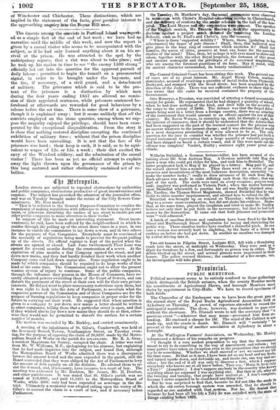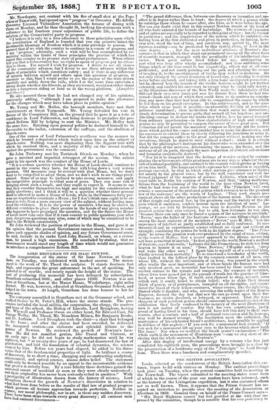Vranintial.
PUBLIC MEETINGS.
Political movement seems to be entirely confined to those gatherings which distinguish the British autumn, when the county Member meets his constituents at Agricultural Shows and borough Members meet theirs by appointment in City-Halls. Iire have to record specimens of both kinds.
The Chancellor of the Exchequer was to have been the great gun at the annual show of the Royal Bucks Agricultural Association held at Aylesbury on Thursday. A crowd of reporters attended to record the anticipated manifesto. The show, however, was destined to pass over without the showman. Mr. Disraeli wrote to tell the secretary that "a previous event "—whatever that may mean—prevented him from at- tending. He enclosed a cheque for 10/. The mind of the Cabinet is not made up, and the oracle is dumb. Mr. Disraeli will " certainly " be present at the meeting of another association at Aylesbury in about a fortnight. At the Wallington Farmers' Association, on Wednesday, Mr. Henley volunteered a defence of his remarks on progress.
"I thought it a very modest proposition to say that the Government meant to try to do something in the way of amendment and reform ; but some parties have taken an exception even to the proposition that we should try to do something. Whether we shall succeed or not we cannot say till the time come. Be that as it may, I have been set on my head and my heels, and turned upside down, and downside up, and inside out, one way and an- other • but the end of it all was only to discover a fact, which I. suppose everybody who knows me at all knew before. They say, Hang it, he is only a Tory ! ' (Laughter.) I don't suppose anybody in the country who knows anything about me supposed I was anything else. But that is all, after all the twisting and turning' that people have arrived at. I don't complain, becauee I never expected to be -considered anything else." But he was surprised to find that, because he did not like the made in which the old rotten borough system was amended, that he should be regarded as one satisfied with that system. Not he. He denied that because he had been all his life a Tory he was satisfied with the state of things existing before 1832. Mr. Newdegate, not content with his fire of small shot at the Pope when at Tamworth, has:opened upon " progress " at Coventry. He did the closest:7 Licensed Victuallers' Association the honour of dining with them on Monday, and he then thought fit, backing his statements with a reference to his fourteen years' experience of public life, to define the relation of the Conservative party to progress. "I believe it is only by a firm adherence to those principles upon which the constitution of England is founded that you can preserve intact the inestimable blessings of freedom which it is your privilege to possess. Be assured that if we wish the country to continue in a course of progress, and I say 'progress,' advisedly, such a wish will be best accomplished by re- maining within the limits of those principles the practice of which has raised this country to its present state of proud preffmmence. When others teu you that a Conservative has no right to speak of progress pay no atten- tion to them. For myself I wish for progress. I desire to see all classes of the community advance, but I desire to see theni advance within the limits of principles which constitute safety ; and if there is any difference of opinion between myself and others upon this question of progress, it amounts to this, that I would prefer to see the engine of the state driven carefully and safele, down the rails, while I at the same time entertain a strong doubt whether the liberals, as they are termed, would not either shunt us into a dangerous siding or land us at the wrong platform. (Laughter and cheers.)
Ile also assured them that he had not changed any of his opinions, graciously adding, "although I am prepared to make due allowance for the changes which may have taken place in public opinion."
Mr. Young and Mr. Mellor, the borough members, have met their eonstitutents at Great Yarmouth. Mr. Young defended his vote in favour of the Conspiracy Bill, on the ground that he gave it as a vote of confidence in Lord Palmerston, not being desirous to prejudice the pro- mised Reform Bill by helping to oust the Minister. Mr. Mellor took the same line. Entering upon general politics he declared himself to be favourable to the ballot, extension of the suffrage, and the abolition of Church-rates. One of the causes of Lord Palmerston's overthrow was the manner in which he treated a deputation which waited upon him on the subject of church-rates. Nothing was more displeasing than the flippant tone with which he received them, and a majority of fifty on the second reading against the government was the comment.
Sir John Trelawny met his Tavistock friends on Monday • when he gave a succinct and impartial retrospect of the session. One salient point in his speech was the conduct of the House of Lords. "It is a serious question whether the House of Lords should continue to persist in the course they have, for they will. bring down a very serious question. Old measures may be revived with that House, but we don't want to be compelled to adopt them, and we don't wish to see things preci- pitated. Some of us may be inclined to take strong measures, and apply the competitive principle to eldest sons of peers. fhey run some risk of bringing about such a result, and they ought to expect it. It seems to me that they consider themselves too high and mighty for the consideration of public questions ; and I think it will be a question whether three persons shallbe allowed to make a House of Lords, while in the Commons forty per- ms are required to constitute a House ; for I don't think men ought to be al- lowed to vote from a mere cursory view of the subject, without having mas- tered the evidence. It is in the power of members who may be absent in different countries to place their proxies in the hands of any given member who happens to have prejudged the question, and for the future the House of Lords must take care that if it runs counter to public questions year after year, dangerous questions may arise, some of which may be considered to be fatal to the British constitution."
Sir John reviewed the position of parties in the House, and gave it as his opinion that the present Government cannot stand, because it com- prises such opposite shades of o_pinion, and any future Government must, he said, include in its ranks Lord John Russell, on whom, as a states- man, he passed a high encomium. He concluded by Mating, that no Government would stand any length of time which would not guarantee to introduce a comprehensive Reform Bill.



























 Previous page
Previous page